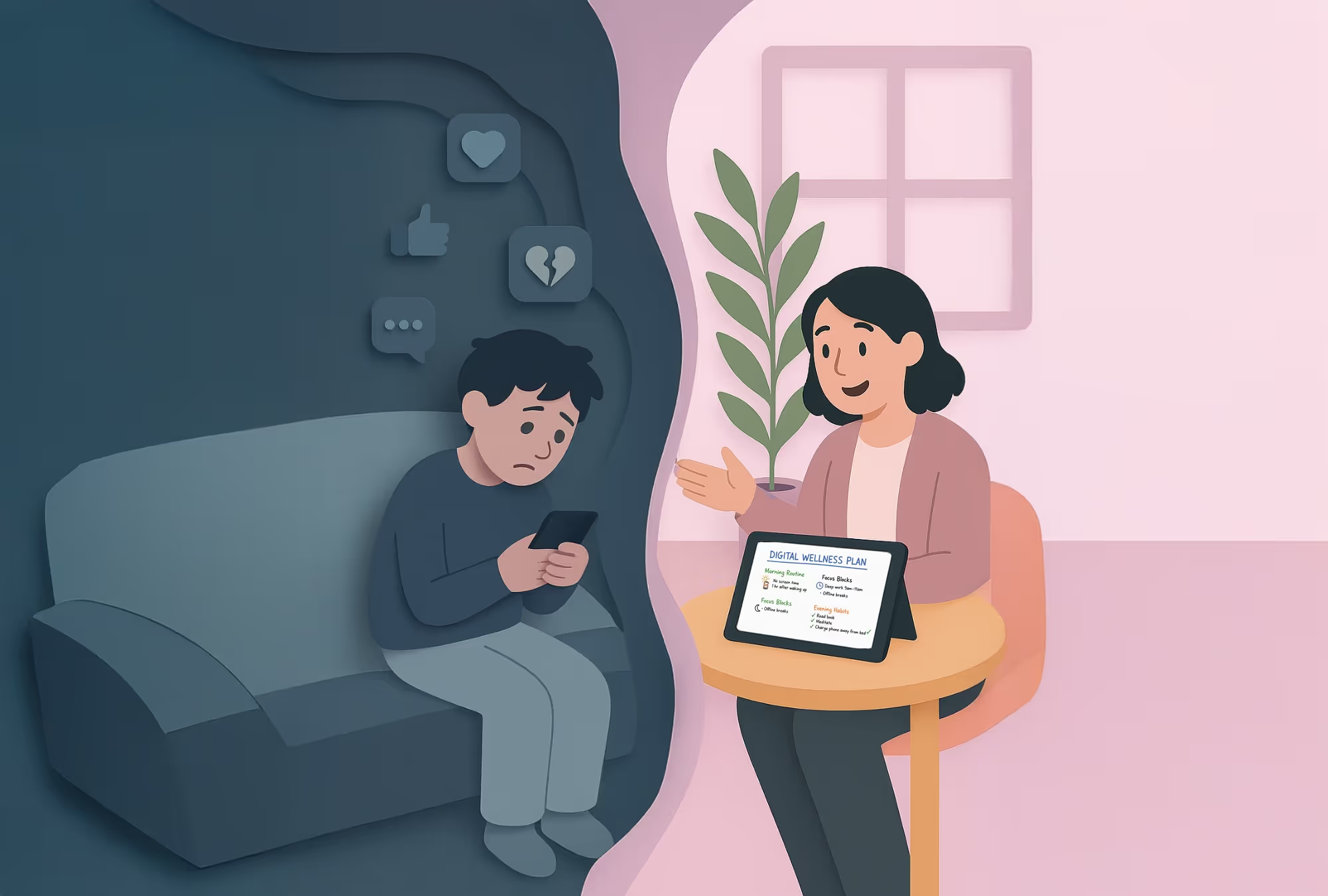In today’s digital world, young people are constantly exposed to mental health content online. While some of this content can be empowering, much of it can feel overwhelming or even harmful. At PlaySpace, our priority is supporting you helping youth navigate online content with self-compassion and balance.
Social media platforms are flooded with posts about anxiety, depression, and self-care. While these can normalize mental health conversations, they can also lead to comparison, misinformation, or emotional overload. Teens may feel pressured to conform to certain “wellness trends” or misinterpret symptoms they see online.
Social media habits can reveal a lot about how clients engage with mental health content online. Try weaving in open-ended questions about social media into your sessions to assess your client's experiences online, such as “What kind of social media content do you see online?” or “Is there any content online that makes you feel overwhelmed or confused?” These questions can provide valuable insights about your client's social media and what content they are being served. If we can bring these important topics into the therapy room, clients will have the support of a trusted adult to help them navigate and interpret sensitive social media content.
Media literacy is understanding and thinking critically about the information we see, read, and hear in the media and for youth, especially important when they are on social media. It is important to encourage clients to think critically about the mental health information they see online and to create healthy relationships with the content they are consuming online. Let them know it’s okay to question what they read, after all, not everything out there is credible, accurate or fits their personal journey.
Try This: Grab PlaySpace’s whiteboard and create a fun “Fact vs. Fiction” chart. Work together to bust common mental health myths they’ve seen online and replace them with real, evidence-backed info.
Encourage clients to practice self-kindness when engaging with social media. Instead of judging themselves for how much they scroll, what they post, or how they compare to others, they can learn to notice these moments with curiosity and care. Remind them that everyone filters what they share online - no one’s feed tells the whole story. By approaching their online experiences with compassion rather than criticism, young people can build resilience, reduce shame, and maintain a healthier sense of self-worth both on and offline.
Activity Idea: Use the AI storybook builder to co-create a story about a character who learns to embrace imperfection. This can help clients internalize self-compassion in a creative, engaging way.
Encourage youth to set limits or boundaries with how they feel comfortable engaging with social media and support the process of prioritizing content that feels relatable, authentic, and aligned with their interests. Help them reflect on how certain accounts or topics make them feel, and guide them in curating their feeds to include voices, communities, and messages that uplift and support their mental health.
Practical Tip: Work together in the whiteboard to create a “digital wellness plan” , including steps like unfollowing triggering accounts, scheduling screen-free time, and identifying positive online communities.
Clinicians can support youth by identifying and engaging with online spaces that foster connection, support, and authenticity. Encourage clients to seek out communities that reflect their values and experiences, rather than those that trigger comparison or negativity. Helping young people recognize the difference between supportive and harmful interactions can empower them to use social media intentionally - as a place to learn, express themselves, and build meaningful connections that enhance their wellbeing.
Sometimes, youth need help processing the emotions triggered by online content, which can range from anxiety and sadness to frustration or confusion. Play-based interventions can provide a safe and creative outlet for these feelings, allowing clients to explore and express their emotions in a non-verbal, low-pressure environment. These interventions not only help youth articulate their feelings but also build emotional resilience and foster a sense of empowerment in navigating the digital world.
Ultimately, the goal is to help young people navigate the digital world with confidence, curiosity, and self-awareness. Clinicians can play a key role in equipping clients with the tools to pause, reflect, and make intentional choices about how they use social media, rather than feeling controlled by it. Encourage youth to set personal goals for their online engagement, notice what content supports their wellbeing, and advocate for their mental health needs in digital spaces. By reinforcing their sense of agency and self-trust, clinicians can help youth transform social media from a source of pressure into an opportunity for growth, connection, and self-expression.
Supporting youth in building healthier relationships with social media starts with giving them space to explore, reflect, and grow. With PlaySpace’s interactive tools, like the whiteboard and storybook creator, clinicians can design creative, evidence-informed interventions that help clients develop self-awareness, practice self-compassion, and build confidence in navigating their digital world.
Ready to see how PlaySpace can transform your practice? Explore our tools or sign up for a free demo today!

Lorem ipsum dolor sit amet, consectetur adipiscing elit, sed do eiusmod tempor incididunt ut labore et dolore magna aliqua. Ut enim ad minim veniam, quis nostrud exercitation ullamco laboris nisi ut aliquip ex ea commodo consequat. Duis aute irure dolor in reprehenderit in voluptate velit esse cillum dolore eu fugiat nulla pariatur.
Block quote
Ordered list
Unordered list
Bold text
Emphasis
Superscript
Subscript
.avif)